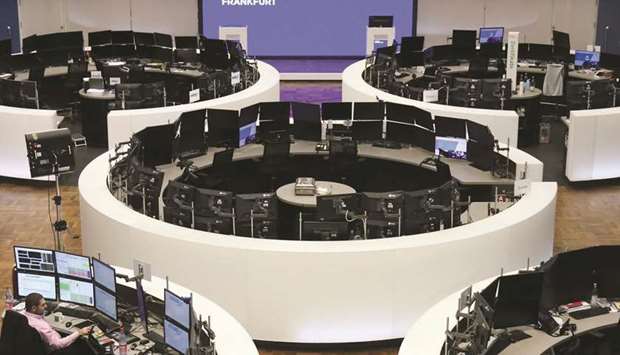European shares fell on Friday as doubts over a post-Brexit trade deal and a stimulus package in the United States capped gains at the end of a solid week.
The pan-European STOXX 600 index broke a four-day rally to end 0.4% lower, reversing gains that followed a surprise rise in German business morale in December.
The German DAX gave up gains of as much as 0.8% to end in the red. The Ifo institute’s upbeat data came even as Europe’s biggest economy went into a strict lockdown to contain a second wave of coronavirus infections.
Britain’s exporter-heavy index lost 0.3%, despite a weaker pound after Britain and the European Union said they remained far apart on a number of issues and that it was becoming more likely they would fail to reach a trade agreement before a December 31 deadline.
“This is the real final crunch time, so that will likely effect the markets in a broader sense rather than just the pound play,” said Connor Campbell, a financial analyst at Spreadex.
In the United States, Congress looked increasingly unlikely to meet a deadline to agree on $900bn in fresh Covid-19 aid and instead may pass a third stopgap spending bill to keep the government from shutting down at midnight.
“Markets are heading into the weekend with these two big unknowns.
Investors may not get to react until Monday morning because the answer, especially for Brexit, might be between Sunday and Monday morning,” Campbell said. The STOXX 600 ended the week with a 1.5% gain, its sixth week in the black in seven.
Optimism around vaccine rollouts in Britain and potential roll outs in other part of Europe before the year-end, as well as progress in US stimulus talks underpinning hopes of a global economic recovery, lifted sentiment this week.
Travel & leisure stocks slipped on Friday, with British Airways-owner IAG down 2.1% after a media report that it had agreed to buy Spanish carrier Air Europa for 500mn euros ($612.55mn). In M&A moves, Dutch health technology firm Philips rose 1.7% after it agreed to buy US cardiac diagnostics and monitoring firm BioTelemetry in a deal worth $2.8bn.
Finnish paint producer Tikkurila soared more than 60% after US firm PPG Industries made an offer to buy the company for a total of 1.1bn euros ($1.35bn).
Global stock markets marked time while the pound retreated on Friday with the focus firmly on whether Britain and the European Union can finally agree a post-Brexit trade deal.
“This week ends just like last week with the market focused on an apparent Sunday deadline to approve a Brexit deal,” remarked AJ Bell investment director Russ Mould.
Sterling has fallen “as government ministers and (British Prime Minister) Boris Johnson himself have appeared to pour cold water on the prospects of a deal,” said Mould.
“Overall though investors are seeing this as bluster intended to enable the UK side to claim victory in the negotiations assuming an agreement is eventually brokered,” he added.
“Despite the near-term risks and uncertainties related to the pandemic and Brexit, the medium-term outlook for the UK remains favourable,” said Kallum Pickering, senior economist at Berenberg.
“With luck, the UK and the EU will strike a deal shortly that will minimise the disruptions to the UK from leaving the EU Single Market and Customs Union on December 31.
Fading virus risks over the course of 2021 and a successful UK-EU deal should support confidence, spending and investment,” Pickering added.
British and EU negotiators on Friday plunged into the “final hours” of their scramble for a deal, deeply divided on the highly-charged issue of fishing rights.
The UK will leave the EU single market in less than two weeks and time has all but run out for an agreement to be approved that heads off a severe economic shock.
The pound, which has hit 19-month highs against the dollar this week on trade deal optimism, retreated on Friday.
Meanwhile, German business confidence unexpectedly rose in December, a key survey showed, even as the country ends the year back under a new lockdown to curb a second coronavirus wave.
Asian stock markets mostly closed lower earlier in the day.
The Bank of Japan on Friday extended an emergency virus-related lending programme but kept its monetary easing policy unchanged, as the country faces a record spike in new Covid-19 cases.
Long-term economic hope has meanwhile overshadowed data showing an unexpected jump in US jobless numbers, which followed a report earlier in the week that revealed a drop in retail sales.
On Capitol Hill, politicians remain locked in discussions for a rescue package they hope to get passed before the end of the year when crucial support measures for Americans run out.

Traders work at the Frankfurt Stock Exchange. The DAX index gave up gains of as much as 0.8% to end in the red yesterday.
